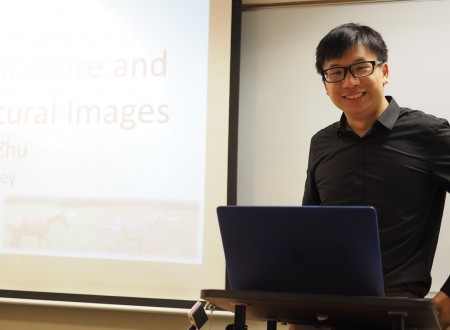Robotic Morphing Matter
Abstract: Morphing matter harnesses the programmability in material structures and compositions to achieve transformative behaviors and integrates sensing, actuation, and computation to create adaptive and responsive material systems. These material systems can be leveraged to design soft robots, self-assembling furniture, adaptive fabrics, and self-folding foods. In this talk, Lining presents the recent works in the [...]
Carnegie Mellon University
Robust Active SLAM for Real-time Large-scale Indoor Dense 3D Reconstruction
Abstract: Real-time dense 3D reconstruction of indoor environments has been a popular research field due to its wide application, such as inspection, virtual / augmented reality (VR/AR), and service robotics. While many state-of-the-art algorithms are capable of reconstructing accurate 3D dense models in general indoor scenes, robustness is still an unsolved problem for all of [...]
Faculty Candidate: Yuke Zhu
Talk: Closing the perception-action loop Abstract: Robots and autonomous systems have been playing a significant role in the modern economy. Custom-built robots have remarkably improved productivity, operational safety, and product quality. However, these robots are usually programmed for specific tasks in well-controlled environments, unable to perform diverse tasks in the real world. In this talk, I will [...]
The Mechanical Side of Artificial Intelligence
Abstract: Artificial Intelligence typically focuses on perception, learning, and control methods to enable autonomous robots to make and act on decisions in real environments. On the contrary, our research is focused on the design, mechanics, materials, and manufacturing of novel robot platforms that make the perception, control, or action easier or more robust for natural, unstructured, and [...]
Self-Directed Learning
Abstract: Generalization, i.e., the ability to adapt to novel scenarios, is the hallmark of human intelligence. While we have systems that excel at recognizing objects, cleaning floors, playing complex games and occasionally beating humans, they are incredibly specific in that they only perform the tasks they are trained for and are miserable at generalization. In [...]
Learning to see the physical world
Abstract: Human intelligence is beyond pattern recognition. From a single image, we're able to explain what we see, reconstruct the scene in 3D, predict what's going to happen, and plan our actions accordingly. In this talk, I will present our recent work on physical scene understanding---building versatile, data-efficient, and generalizable machines that learn to see, reason about, and interact [...]
Learning to Synthesize Images
Abstract: People are avid consumers of visual content. Every day, we watch videos, play games, and share photos on social media. However, there is an asymmetry – while everybody is able to consume visual content, only a chosen few (e.g., painters, sculptors, film directors) are talented enough to express themselves visually. For example, in modern [...]
Carnegie Mellon University
Direct Drive Hands: Force-Motion Transparency in Gripper Design
Abstract: The Direct Drive Hand (DDHand) project is exploring a new design philosophy for grippers. The conventional approach is to prioritize clamping force, leading to high gear ratios, slow motion, and poor transmission of force/motion signals. Instead, the DDHand prioritizes transparency: we view the gripper as a signal transmission channel, and seek high-bandwidth, high-fidelity transmission [...]







